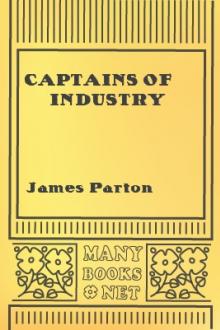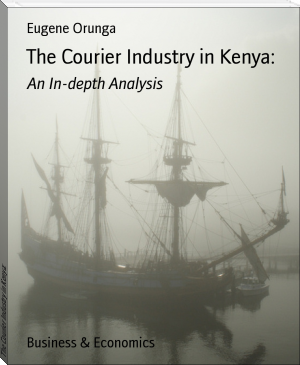Captains of Industry by James Parton (life changing books to read TXT) 📕

- Author: James Parton
- Performer: -
Book online «Captains of Industry by James Parton (life changing books to read TXT) 📕». Author James Parton
The Project Gutenberg EBook of Captains of Industry, by James Parton
This eBook is for the use of anyone anywhere at no cost and with
almost no restrictions whatsoever. You may copy it, give it away or
re-use it under the terms of the Project Gutenberg License included
with this eBook or online at www.gutenberg.org
Title: Captains of Industry
or, Men of Business Who Did Something Besides Making Money
Author: James Parton
Release Date: January 4, 2007 [EBook #20064]
[This file was first posted on December 9, 2006]
Language: English
*** START OF THIS PROJECT GUTENBERG EBOOK CAPTAINS OF INDUSTRY ***
Produced by Stacy Brown, Barbara Tozier, Bill Tozier and the Online
Distributed Proofreading Team at http://www.pgdp.net
CAPTAINS OF INDUSTRY OR MEN OF BUSINESS WHO DID SOMETHING
BESIDES MAKING MONEY A BOOK FOR YOUNG AMERICANS BY JAMES PARTON FIFTH THOUSAND
HOUGHTON, MIFFLIN AND COMPANY
New York: 11 East Seventeenth Street
The Riverside Press, Cambridge
1890
By JAMES PARTON.
All rights reserved.
The Riverside Press, Cambridge, Mass., U. S. A.
Electrotyped and Printed by H. O. Houghton & Company.
PREFACE.
In this volume are presented examples of men who shed lustre upon ordinary pursuits, either by the superior manner in which they exercised them or by the noble use they made of the leisure which success in them usually gives. Such men are the nobility of republics. The American people were fortunate in having at an early period an ideal man of this kind in Benjamin Franklin, who, at the age of forty-two, just mid-way in his life, deliberately relinquished the most profitable business of its kind in the colonies for the sole purpose of developing electrical science. In this, as in other respects, his example has had great influence with his countrymen.
A distinguished author, who lived some years at Newport, has expressed the opinion that the men who occupy the villas of that emerald isle exert very little power compared with that of an orator or a writer. To be, he adds, at the head of a normal school, or to be a professor in a college, is to have a sway over the destinies of America which reduces to nothingness the power of successful men of business.
Being myself a member of the fraternity of writers, I suppose I ought to yield a joyful assent to such remarks. It is flattering to the self-love of those who drive along Bellevue Avenue in a shabby hired vehicle to be told that they are personages of much more consequence than the heavy capitalist who swings by in a resplendent curricle, drawn by two matched and matchless steeds, in a six-hundred dollar harness. Perhaps they are. But I advise young men who aspire to serve their generation effectively not to undervalue the importance of the gentleman in the curricle.
One of the individuals who has figured lately in the society of Newport is the proprietor of an important newspaper. He is not a writer, nor a teacher in a normal school, but he wields a considerable power in this country. Fifty men write for the journal which he conducts, some of whom write to admiration, for they are animated by a humane and patriotic spirit. The late lamented Ivory Chamberlain was a writer whose leading editorials were of national value. But, mark: a telegram of ten words from that young man at Newport, written with perspiring hand in a pause of the game of polo, determines without appeal the course of the paper in any crisis of business or politics.
I do not complain of this arrangement of things. I think it is just; I know it is unalterable.
It is then of the greatest possible importance that the men who control during their lifetime, and create endowments when they are dead, should share the best civilization of their age and country. It is also of the greatest importance that young men whom nature has fitted to be leaders should, at the beginning of life, take to the steep and thorny path which leads at length to mastership.
Most of these chapters were published originally in "The Ledger" of New York, and a few of them in "The Youths' Companion" of Boston, the largest two circulations in the country. I have occasionally had reason to think that they were of some service to young readers, and I may add that they represent more labor and research than would be naturally supposed from their brevity. Perhaps in this new form they may reach and influence the minds of future leaders in the great and growing realm of business. I should pity any young man who could read the briefest account of what has been done in manufacturing towns by such men as John Smedley and Robert Owen without forming a secret resolve to do something similar if ever he should win the opportunity.
TABLE OF CONTENTS. David Maydole, Hammer-Maker 9 Ichabod Washburn, Wire-Maker 18 Elihu Burritt, the Learned Blacksmith 27 Michael Reynolds, Engine-Driver 36 Major Robert Pike, Farmer 43 George Graham, Clock-Maker, buried in Westminster Abbey 51 John Harrison, Exquisite Watch-Maker 58 Peter Faneuil, and the Great Hall he built 65 Chauncey Jerome, Yankee Clock-Maker 79 Captain Pierre Laclede Liguest, Pioneer 89 Israel Putnam, Farmer 96 George Flower, Pioneer 104 Edward Coles, Noblest of the Pioneers, and his Great Speech 117 Peter H. Burnett, Banker 126 Gerrit Smith 133 Peter Force, Printer 140 John Bromfield, Merchant 148 Frederick Tudor, Ice Exporter 156 Myron Holley, Market-Gardener 163 The Founders of Lowell 170 Robert Owen, Cotton-Manufacturer 180 John Smedley, Stocking-Manufacturer 188 Richard Cobden, Calico Printer 195 Henry Bessemer 206 John Bright, Manufacturer 212 Thomas Edward, Cobbler and Naturalist 224 Robert Dick, Baker and Naturalist 232 John Duncan, Weaver and Botanist 240 James Lackington, Second-Hand Bookseller 247 Horace Greeley's Start 254 James Gordon Bennett, and how he founded his "Herald" 264 Three John Walters, and their Newspaper 275 George Hope 288 Sir Henry Cole 294 Charles Summers 300 William B. Astor, House-Owner 307 Peter Cooper 313 Paris-Duverney, French Financier 332 Sir Rowland Hill 342 Marie-Antoine Carème, French Cook 349 Wonderful Walker, Parson of all Work 355 Sir Christopher Wren 363 Sir John Rennie, Engineer 372 Sir Moses Montefiore 379 Marquis of Worcester, Inventor of the Steam-Engine 385 An Old Dry-Goods Merchant's Recollections 392 PORTRAITS. ICHABOD WASHBURN Frontispiece. CHAUNCEY JEROME 79 GERRIT SMITH 133 MYRON HOLLEY 163 JOHN BRIGHT 212 JOHN DUNCAN 240 PETER COOPER 313 SIR ROWLAND HILL 342 CAPTAINS OF INDUSTRY. DAVID MAYDOLE, HAMMER-MAKER.When a young man begins to think of making his fortune, his first notion usually is to go away from home to some very distant place. At present, the favorite spot is Colorado; awhile ago it was California; and old men remember when Buffalo was about as far west as the most enterprising person thought of venturing.
It is not always a foolish thing to go out into the world far beyond the parent nest, as the young birds do in midsummer. But I can tell you, boys, from actual inquiry, that a great number of the most important and famous business men of the United States struck down roots where they were first planted, and where no one supposed there was room or chance for any large thing to grow.
I will tell you a story of one of these men, as I heard it from his own lips some time ago, in a beautiful village where I lectured.
He was an old man then; and a curious thing about him was that, although he was too deaf to hear one word of a public address, even of the loudest speaker, he not only attended church every Sunday, but was rarely absent when a lecture was delivered.
While I was performing on that occasion, I saw him sitting just in front of the platform, sleeping the sleep of the just till the last word was uttered.
Upon being introduced to this old gentleman in his office, and learning that his business was to make hammers, I was at a loss for a subject of conversation, as it never occurred to me that there was anything to be said about hammers.
I have generally possessed a hammer, and frequently inflicted damage on my fingers therewith, but I had supposed that a hammer was simply a hammer, and that hammers were very much alike. At last I said,—
"And here you make hammers for mankind, Mr. Maydole?"
You may have noticed the name of David Maydole upon hammers. He is the man.
"Yes," said he, "I have made hammers here for twenty-eight years."
"Well, then," said I, shouting in his best ear, "by this time you ought to be able to make a pretty good hammer."
"No, I can't," was his reply. "I can't make a pretty good hammer. I make the best hammer that's made."
That was strong language. I thought, at first, he meant it as a joke; but I soon found it was no joke at all.
He had made hammers the study of his lifetime, and, after many years of thoughtful and laborious experiment, he had actually produced an article, to which, with all his knowledge and experience, he could suggest no improvement.
I was astonished to discover how many points there are about an instrument which I had always supposed a very simple thing. I was surprised to learn in how many ways a hammer can be bad.
But, first, let me tell you how he came to think of hammers.
There he was, forty years ago, in a small village of the State of New York; no railroad yet, and even the Erie Canal many miles distant. He was the village blacksmith, his establishment consisting of himself and a boy to blow the bellows.
He was a good deal troubled with his hammers. Sometimes the heads would fly off. If the metal was too soft, the hammer would spread out and wear away; if it was too hard, it would split.
At that time blacksmiths made their own hammers, and he knew very little about mixing ores so as to produce the toughest iron. But he was particularly troubled with the hammer getting off the handle, a mishap which could be dangerous as well as inconvenient.
At this point of his narrative the old gentleman showed a number of old hammers, such as were in use before he began to improve the instrument; and it was plain that men had tried very hard before him to overcome this difficulty.
One hammer had an iron rod running down through the handle with a nut screwed on at the end. Another was wholly composed of iron, the head and handle being all of one piece. There were various other devices,





Comments (0)